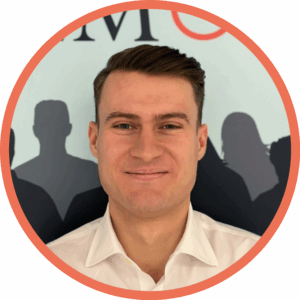Thank you for your interest in Demos and the world of think tanks. Please note that these responses to frequently asked questions have been written by our researchers, and are reflective of their individual experiences of working here. Your experience of think tanks may be different, but are certainly just as valid.
While the think tank world is a competitive field, Demos has no minimum academic requirements and is taking active steps to increase the proportion of people applying to think tanks from underrepresented backgrounds. You can read more about our approach to this in our DIEJ policy.
Researcher biographies and journeys to Demos
Naema: So I began with studying Politics and International Relations at the University of Nottingham and then I did a MSc in Empires, Colonialism and Globalisation at the LSE. During my studies, I did various placements to figure out my interests. These included academic research, journalism and parliamentary assistance. I realised I enjoyed research the most. As much as I loved university, I really wanted to blend studying with real life impact. This led me to the think tank world! You have the ability to learn a lot about really interesting topics as you would in academic research, but a part of your job is also the impact – engaging with decision makers and business to take up your ideas.

Aidan: I studied PPE at Queen’s University Belfast, followed by a Public Policy MSc at UCL. I have a particular interest in constitutional and institutional democratic reforms, devolution and regional growth, savings mechanisms, and skills policy. During my Masters, I realised why I would rather work in a think tank than in other jobs/organisations that touch the policymaking process such as in Parliament or the Civil Service: in think tanks, ideas are free-flowing – you have greater freedom (and responsibility) as an individual in conducting your research. In no other role do you see the policy process from as many angles as you do within a think tank; especially in a think tank like Demos, where we believe strongly in policymaking from the ground up.

Jamie: I started by studying politics, sociology and anthropology at the University of Cambridge, before I did an MSc in Political Sociology at LSE. I was involved in various kinds of research work while I was an undergraduate and master’s student, including internships at local charities and within one of the university’s research centres, which led me to build up a portfolio of articles and short pieces published online. I also spent time volunteering in areas I care about, such as refugee aid and human rights. I decided early on that I wanted to specialise in the social and political aspects of technology and data. I chose my courses and designed my research dissertations to reflect this interest. While I was at LSE, I took advantage of the methods training available to improve my skills in quantitative and digital research methods. After LSE, I started a job as a research assistant at the Alan Turing Institute, the UK’s national research institute for AI and data science, where I was part of a team which focused on accountability and rights in relation to applications of technology. I began on a temporary contract but quickly moved to a permanent position. My role there allowed me to gain lots of research experience. After several years in that role, I decided I wanted to move into a role where I could see direct, real-world impact from my research. That’s when I decided to apply to Demos.
Can you describe what it is like to work in a think tank in three words?
Naema: Challenging, Energetic, Educational
Aidan: Engaging, purposeful, enterprising
Jamie: Impactful, dynamic, purposeful
What has been your favourite thing about working at Demos/ in a think tank?
Naema: Being a part of politics! At Demos, we hosted Liz Kendall’s first speech as Shadow Secretary for Work and Pensions. She covered a number of new announcements, many of which related to our work and thinking. It often feels surreal to be a part of the fast paced world of politics.
Aidan: Seeing your work get published! Whether it’s a report you co-authored, a blog, a newsletter foreword, or even just a report that you did some background work supporting on, seeing your work – your ideas, research, and writing – get published and know that you are contributing to the policymaking process.
Jamie: Meeting people and making connections. Compared to research in other kinds of organisations, there are so many more opportunities to engage with politicians, policymakers, experts, and everyday people.
What has been the most difficult thing about working at Demos/ in a think tank?
Naema: When you decide to work in a think tank, you do so because you are interested in politics and making change. This often means you enter this world with your own interests and aspirations. But working in a team that operates on a project by project basis means not every piece of work will relate to your interests. This can sometimes be jarring but, more often than not, you discover a whole different policy area that you never knew could be so interesting. For me this was employment!
Aidan: External factors influence our work and we have to be prepared and flexible enough to meet these challenges/opportunities. New government policy announcements, reshuffles, scandals and snap-elections can all happen mid-way through research projects. Changing circumstances can impact timelines, shift the target audience, or mean you have to re-think some approaches. Challenges foster opportunities – so this can be beneficial to our work – but it is tricky and requires teamwork and dexterity.
Jamie: One thing which can be tricky is knowing the right tone to pitch your communications. At Demos, we interact with all kinds of people and write for a range of audiences which are internal and external. Are you speaking to a politician or a civil servant? Are you writing a report to be read widely or a briefing for a specific audience? Each publication or conversation can require a different approach. It took me some time to build the experience in knowing how to navigate the intricacies of these differences.
What should I focus on in my written application and interview answers?
Naema: I would advise any aspiring Researcher to reflect deeply on their past experiences. How have they prepared you for a role in think tank research? Be intentional and clear about the experiences you include.
Aidan: Your own strengths and interests – it seems intuitive but it’s super important! At Demos, if you have an interest in a policy area and you have the proactivity, you will be supported on that – and if there is the scope for us to work on it then we will. How will your interests, skills and experiences align with and contribute to Demos’s organisational aims?
Jamie: I would suggest doing two things. First, read through the application materials – and read them carefully. It will be very helpful if you focus on the language used in the job advertisement, such as the role requirements, and make sure you address what is being asked. Secondly, ask yourself how your previous experiences mean you are suited to what is being asked.
What general advice would you give to someone applying to a researcher role in a think tank?
Naema: This is difficult – I have so many different pieces of advice! I’d start by ensuring you are clear about what a think tank is. Be sure you understand what think tanks do and how they do it – for example how do think tanks fund projects or make change with their work? Secondly, be sure your goals and aspirations relate to that. Why do you want to be in a think tank and not at university, consulting or in the civil service? Lastly, be clear about your research interests. Is there a specific policy area that you enjoy or have focused on in the past? At Demos, we cover a wide range of topics so come ready to speak about what you know!
Aidan: In general, be proactive and be confident. We like debate and we want to hear your ideas and what you are interested in.
It’s also important to think about inputs and outputs: what shapes our work as we research policy areas and generate insights and recommendations; what shapes our narrative-setting, framing and the types and formats of recommendations that we make as we translate insight into impact. Policy does not exist in a vacuum – given that our work is in policy, we do not operate in a vacuum either. Think tanks want their research to influence real-world decisions, so it’s important to show that you understand how ideas turn into impact. That means thinking beyond doing thorough research and writing a good report – how would you get the right people to read it? Can you connect your work to current debates, policy timelines and individual policymakers’ and stakeholders’ agendas? Showing you understand how to make research land with decision makers will set you apart.
Jamie: I would say: be thorough but don’t overthink things too much. You may feel you don’t meet all the requirements perfectly, but that is okay – part of the job is taking on new challenges, and you may meet the requirements in ways you haven’t considered. Demos is interested in you as a person and how well you would fit into our team, as well as whether you meet the listed requirements.
Are there any other resources prospective researchers might find useful?
This one may seem obvious, but be sure to spend some time in Demos’ Research Library. Reading some of our papers will provide valuable insight into what a think tank does and the range of subjects covered by our research.
You may also find it helpful to sign up to our weekly newsletter to keep up to date with our latest research, articles, events and reflections on British politics
The Smart Thinking jobs board brings together all the policy and think tank job opportunities currently on offer in the UK. Smart Thinking specialises in research roles as well as other careers in the policy world such as communications, fundraising and events so their specialised jobs board is a good place to start your search.
The Working for an MP website is a resource for anyone working for a British Member of Parliament or with an interest in how Parliament works. The jobs section of w4mp is funded by the House of Commons to provide career development opportunities for those looking for a job with an MP or in other areas of political activity.

